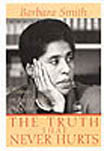 Barbara Smith...
Barbara Smith...Author, Activist, And Independent Scholar
FemmeNoir
A Web Portal For Lesbians Of Color
 Barbara Smith...
Barbara Smith...
"The near
nonexistence of Black lesbian literature which other Black
lesbians and I so deeply feel has everything to do with the
politics of our lives, the total suppression of identity that
all Black women, lesbians or not, must face. This literary
silence is again intensified by the unavailability of an
autonomous Black feminist movement through which we could fight
our oppression and also begin to name ourselves."
--Smith, 1998
Barbara Smith is an author and independent
scholar who has played a groundbreaking role in opening a
national cultural and political dialogue about the intersections
of race, class, sexuality, and gender. In her innovative and
pivotal work, Smith was among the first to define an African
American women's literary tradition and to build Black women's
studies and Black feminism in the United States. She offers a
consistently fresh approach to discussing complex social
problems, especially racism and other types of bigotry.
Smith is acknowledged as one of the first writers in the United
States to claim black feminism for black women in the early
1970s. She has done groundbreaking work in defining a black
women's literary tradition, in examining the sexual politics of
the lives of women of color, in representing the lives of black
lesbians and gay men, and in making connections between race,
class, sexuality, and gender.
A leading feminist writer and activist since the
1960s, Barbara Smith co-founded Kitchen Table: Women of Color
Press, the first U.S. publisher for women of color. Smith's
articles, essays and short stories have appeared in publications
including Ms.,
The New York Times Book
Review, The Black Scholar,
The Nation and Gay
Community News. Editor of three major collections about black
women, Smith was also a general editor -- along with Wilma
Mankiller, Gwendolyn Mink, Marysa Navarro and Gloria Steinem --
of
The Reader's Companion to U.S. Women's History. Her
numerous awards include the 1994 Stonewall Award for service to
the lesbian and gay community. Smith served on the Board
of Advisors for the New York Public Library's award-winning."
She was a Scholar-in-Residence at the
Schomburg
Center for Research in Black Culture in New York City in
1995-96 and a Fellow at the
Bunting
Institute of Radcliffe College in 1996-97.
She has appeared in films such as "Pink Triangles" and Marlon
Riggs' "Black Is, Black Ain't". Other appearances have been on
National Public Radio, MSNBC, The Pacifica Network, "Donahue",
and "Charlie Rose". Her essays have appeared in numerous
publications, including "The Village Voice", "Gay Community
News", and "The Guardian". Her writings include "The Truth
That Never Hurts: Writings on Race, Gender, and Freedom" her
work also appears in author Kris Kleindienst's "This is What
Lesbian Looks Like."
Barbara Smith calls for an awareness of the works of African
American lesbian writers as she calls for an awareness of the
political implication that marginalizing black lesbian writers
continue to make on all women's lives. As little has changed in
the representations of African American lesbians in literature
since the late 1970's and mid 1980's, Smith's message also has
not changed. Smith continues to call for an awareness of the
inextricable interconnectedness of race, class, and gender on
all of our lives, and she continues to show the interconnection
of literature, politics, and theory to the empowerment of black
women everywhere.
More Multimedia -- Video Clips of February
8, 2000 Presentation: "The Truth That Never Hurts:
Writings on Race, Gender and Freedom"
 An
Overview of The Truth That Never Hurts (1:51)
An
Overview of The Truth That Never Hurts (1:51)
Head Note For Book Section "A Rose"
(2:26)
No Comfort Counseling Available to Black
Children
(1:43)
Building Movements That Are A Coalition Effort
Towards A Multi-Issue Agenda
(1:48)
"Home Girls: A Black
Feminist Anthology"
Looking at Our Own Issues (5:36)
For More Visit:
http://www.oap.ucsb.edu/diversity/events/BSmith/BSvideos.html
"Here's the Movement, Let's Start Building":
|
|
Description:
|
The Truth That Never Hurts: Writings on Race, Gender and Freedom
Yours in Struggle: Three Feminist Perspectives on AntiSemitism and Racism
This Bridge Called My Back: Writings by Radical Women of Color
All the Women Are White, All the Blacks Are Men, but Some of Us Are Brave: Black Women's Studies
Home